THE OUTLAW OCEAN PROJECT
North Korean forced labour programme condemns workers to beatings, sexual abuse in Chinese seafood factories
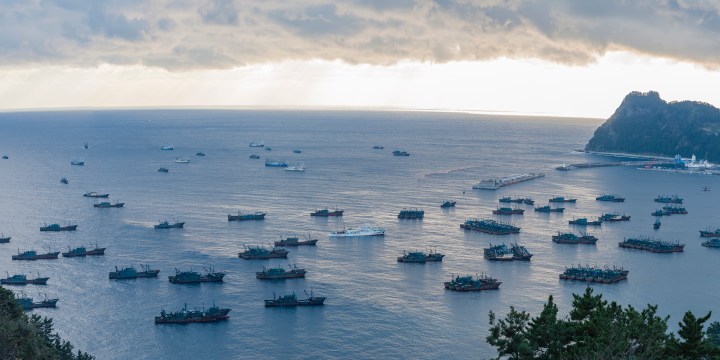
Despite UN and US sanctions making it illegal for foreign companies to use North Korean workers or import products tied to North Korean labour, China and big US companies like Walmart and McDonald’s pay little heed. Meanwhile, labourers face docked pay, prison-like conditions and the constant threat of sexual violence.
In February 2023, Donggang Jinhui Food, a seafood processing company in Dandong, China, threw a party. It had been a successful year: The company had opened a new plant at its compound in the city, and had doubled the amount of squid that it exported to the US.
Videos of the event, posted on Douyin, the Chinese version of TikTok, feature singers, instrumentalists, dancers, fireworks and strobe lights. A crucial aspect of the company’s success had been its use of North Korean workers, who are sent to work in Chinese factories, in conditions of captivity, to earn money for their government.
Videos posted by the company show machines labelled in Korean, and workers with North Korean accents explaining how to clean and weigh squid. At the party, the company played pop songs popular in Pyongyang, including People Bring Glory to Our Party (written by North Korea’s 1989 poet laureate) and We Will Go to Mount Paektu (a reference to the widely mythologised birthplace of Kim Jong-il).
In the audience, dozens of workers swayed to the music, waving miniature North Korean flags.
A video shown at the event included drone footage of the company’s 21-acre, walled-in compound, which has processing and cold-storage facilities and a seven-floor dormitory for workers. It showed off a wide array of Western certifications, from companies like the Marine Stewardship Council and Sedex, which are supposed to check workplaces for abuses.
A seafood trader who does business with the company estimated that it currently employs between 50 and 70 North Korean workers. Performers at the party wore North Korean colours, and the country’s flag billowed behind them.
When the footage was posted online, a commenter – presumably befuddled, because using North Korean labour violates UN sanctions – asked: “Aren’t you prohibited from filming this?”
That company, like many others in China, relies on a vast programme of forced labour from North Korea. (The company did not respond to requests for comment.) The programme is run by a secretive agency of the North Korean government called Room 39, which oversees activities such as sending assassins abroad, money laundering, nuclear- and ballistic-missile programmes, and cyberattacks. (The agency is so named, according to defectors, because it is based in the ninth room on the third floor of the Korean Workers’ Party headquarters.)
Workers are held in compounds behind barbed wire, under the watch of security agents.
North Korea began sending workers in significant numbers to China in 2012, when 40,000 were given special visas. Since then, North Korea has sent workers to other countries as well, including Russia, Poland, Qatar, Uruguay and Mali. A portion of the workers’ salaries is taken by the government, funding Room 39’s activities, and providing a vital source of foreign currency for Party officials and the state. In 2017, the United Nations estimated that the country made between $1.2-billion and $2.3-billion a year through the programme.
That year, after North Korea tested a series of nuclear weapons, the UN imposed sanctions that made it illegal for foreign companies to use North Korean workers, on the grounds that their labour was coerced and their salaries were funding the regime.
The US passed a law called the Countering America’s Adversaries Through Sanctions Act (CAATSA), which levies heavy fines on companies that import products tied to North Korean labour; the law established a “rebuttable presumption” that categorises work done by North Koreans as forced labour unless proven otherwise.
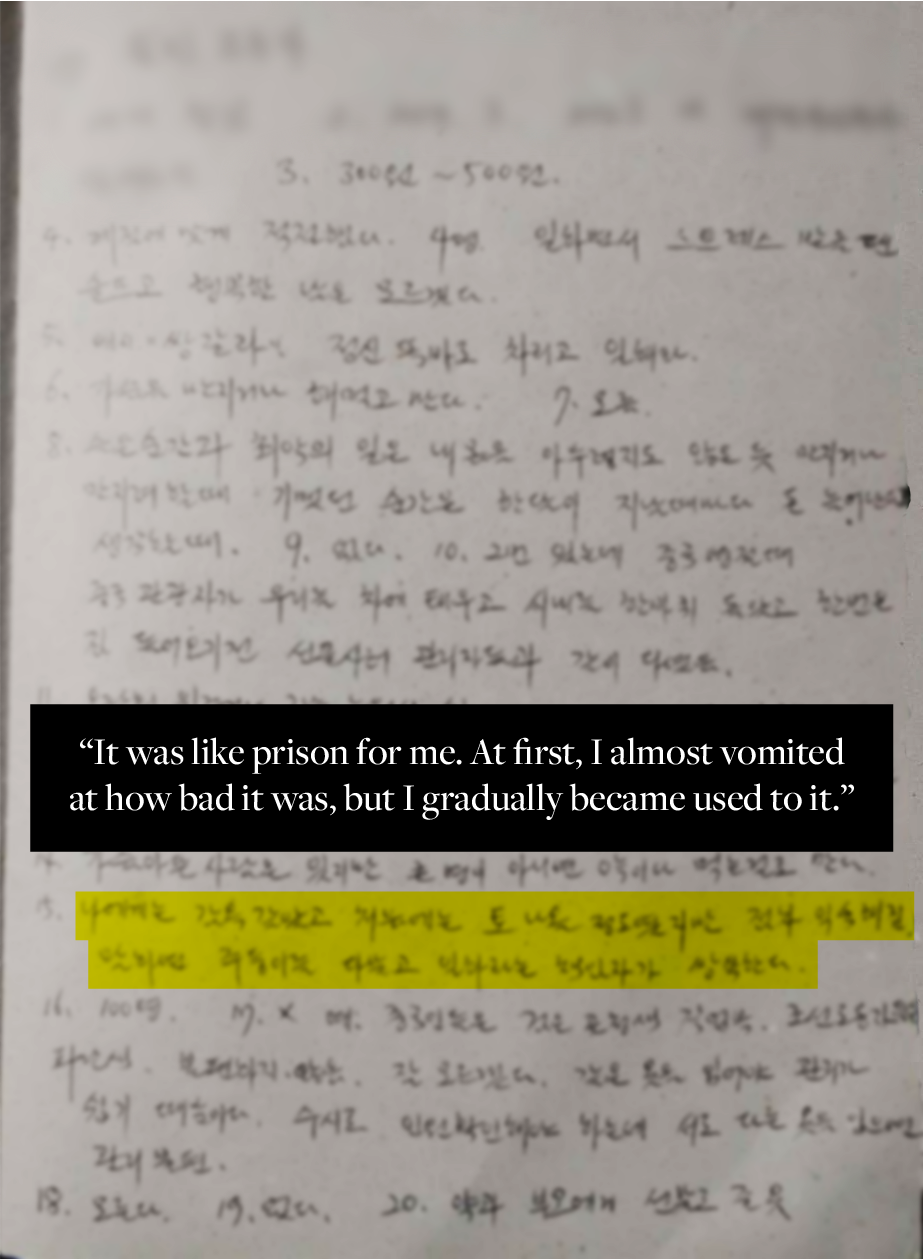
Nevertheless, China has continued to import North Korean workers in large numbers; according to State Department estimates, there are currently upwards of 100,000 North Koreans working in the country.
Many work at construction companies, textile factories and software firms. Many, it turns out, also process seafood.
In 2022, according to a tally from the Chinese government that was inadvertently published online, there were as many as 80,000 North Korean workers just in Dandong, a hub of the seafood industry.
This year, I set out with a team of researchers to document the use of North Korean workers. We reviewed leaked government documents, promotional materials, satellite imagery, online forums and local news reports. We watched hundreds of cellphone videos published on Douyin, Bilibili (another video-sharing site) and WeChat. In some, the presence of North Koreans was explicit. We shared others with experts to review them for North Korean accents, language use and other cultural markers. Reporting in China is almost impossible for Western reporters. But we hired Chinese investigators to visit factories, talk to managers and take footage of production lines. I also secretly sent interview questions, through a team of investigators in the region and their contacts, to two dozen North Koreans (20 workers and four managers) who have recently worked in Chinese factories. Their anonymous responses were transcribed, and the images sent back to me.
Almost all of them described enduring rampant sexual assault at the hands of the managers.
The workers, most of whom are women, described a broad pattern of confinement and violence at the plants. Workers are held in compounds behind barbed wire, under the watch of security agents. Most work gruelling shifts and get at most one day of holiday a month. Several described being beaten by managers for not toiling hard enough.
“It was like prison for me,” a woman who worked at a plant for a few years, noted. “At first, I almost vomited at how bad it was, but I gradually became used to it.”
Almost all of them described enduring rampant sexual assault at the hands of the managers sent to watch over them. “They would say I’m fuckable and then suddenly grab my body and grope my breasts and put their dirty mouth on mine and be disgusting,” a woman who did product transport at a plant in the city of Dalian said.
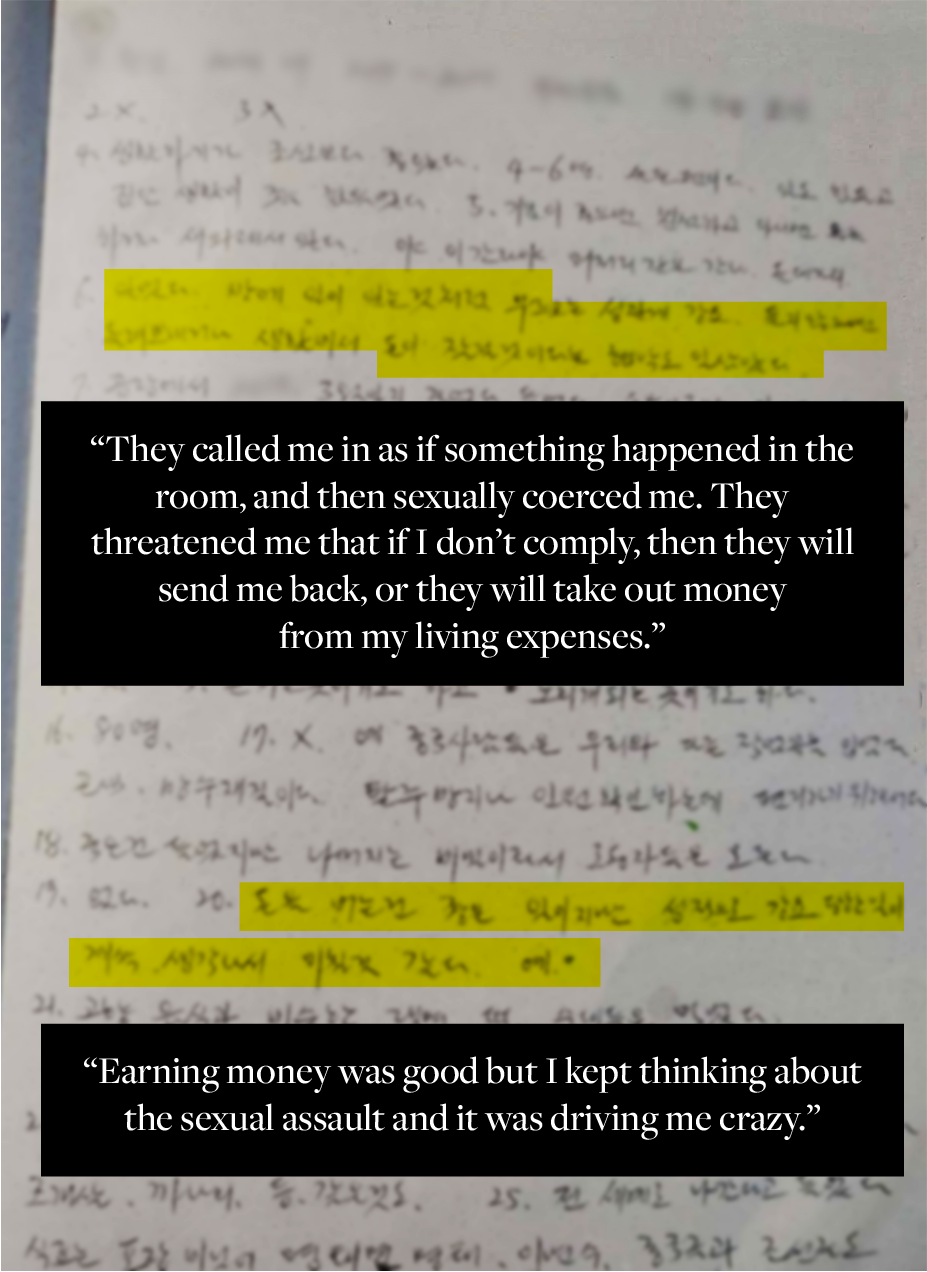
“It’s often emphasised that if you are caught running away, you will be killed without a trace,” a worker who was at Haiqing for more than four years wrote to me. Another, who spent several years at the Jinhui plant, noted: “The worst and saddest moment was when I was forced to have sexual relations when we were brought to a party.”
The workers described being kept at the factories against their will, and being subjected to severe punishment if they tried to escape.
In all, I identified at least 15 seafood processing plants that together have used more than 1,000 North Korean workers since 2017. China officially denies that North Korean workers are in the country. But their presence is an open secret. “They are easy to distinguish,” a Dandong native wrote in a comment on Bilibili.
“They all wear uniform clothes, have a leader, and follow orders.” Often, footage of the workers ends up online. In a video from a plant called Dandong Yuanyi Refined Seafoods, 15 women perform a synchronised dance in front of a mural commemorating “Youth Day”, a North Korean holiday. The video features a North Korean flag and the caption: “North Korea in Donggang cold storage [with] little beautiful women.” (The company did not respond to requests for comment.) Remco Breuker, a North Korea specialist at Leiden University, in the Netherlands, told me: “Hundreds of thousands North Korean workers have for decades slaved away in China and elsewhere, enriching their leader and his Party, while facing unconscionable abuse.”
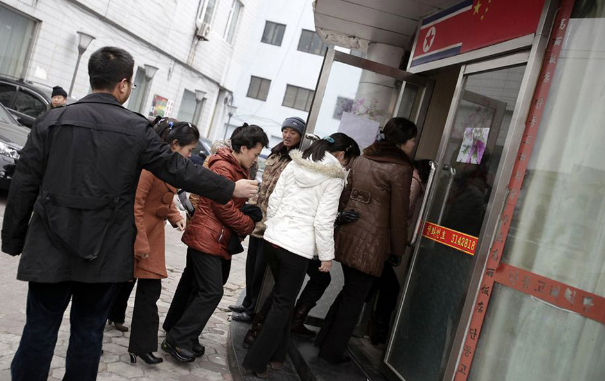
A group of North Korean women on the streets of Dandong in March 2023 being overseen by a North Korean government minder. (Credit: Living in North Korea / The Outlaw Ocean Project)
In late 2023, an investigator from my team visited a Chinese plant called Donggang Xin Xin. He found hundreds of North Korean women working under a red banner that read, in Korean: “Let’s carry out the resolution of the 8th Congress of the Workers’ Party.” (The company did not respond to requests for comment.) Soon after, he visited a nearby plant called Donggang Haimeng Foodstuff, and found a North Korean manager sitting at a wooden desk with two miniature flags, one Chinese and one North Korean. The walls behind the desk were bare except for two portraits of past North Korean leaders Kim Il-sung and Kim Jong-il.
The manager took our investigator to the workers’ cafeteria to eat a North Korean cold-noodle dish called Naengmyeon, and then took him on a tour of the processing floor. Several hundred North Korean women dressed in head-to-toe red uniforms, pink aprons and white rain boots stood shoulder-to-shoulder at long metallic tables under harsh lights, hunched over plastic baskets of seafood, slicing and sorting the products by hand. “They work hard,” the manager said. The factory has exported thousands of tons of pollock to importers that supply major US retailers, including Walmart and ShopRite. (A spokesperson for the company said it does not hire North Korean workers.)
China aggressively conceals its use of North Korean workers.

Ian watching the Chinese fleet through binoculars while on a ship between North and South Korea (Credit: © The Outlaw Ocean Project / Photographer: Fábio Nascimento, May 2019)
Alexander Dukalskis, an international relations professor at University College Dublin, said that they therefore have a hard time speaking out about their condition. “They’re in a country where they may not speak the language, are under surveillance, usually living collectively, and have no experience in contacting journalists,” he said. In late November, after my team’s investigators visited several plants, local authorities distributed pamphlets with stern warnings. One noted that people who try “to contact North Korean workers, or to get close to the workplaces of North Korean workers, will be treated as engaging in espionage activities that endanger national security, and will be punished severely”. The pamphlets also warned that workers who were found to be cooperating with foreign media outlets would face charges under the Anti-Espionage Act.
***
Dandong, a city of two million people, sits on the Yalu River, along the border with North Korea. The “Sino-Korean Friendship Bridge” links Dandong to the North Korean city of Sinuiju. A second bridge, bombed during the Korean War, still extends partway across the river, and serves as a viewing platform for Chinese residents to get a look at the North Koreans living 500m away.
The Friendship Bridge is one of the Hermit Kingdom’s few gateways to the world; 70% of the goods exchanged between the two countries travels across it. Department stores in Dandong keep lists of products preferred by North Korean customers. Souvenir shops sell North Korean ginseng, beer and “7.27” cigarettes, named after the date when the armistice was signed in the Korean War. The city is home to a museum about the conflict, officially called the Memorial Hall of the War to Resist US Aggression and Aid Korea. On boat tours, Chinese tourists buy bags of biscuits to toss to children on the North Korean side of the river.
Officials from Room 39 carefully select workers to send to China, screening applicants’ political loyalties to reduce the risk of defections. To qualify, a person must already have a job at a North Korean company and have a positive evaluation from a local Party official. “These checks start at the neighbourhood,” Breuker said.
Candidates who have family in China, or a relative who has already defected, can be disqualified. Applicants under 27 must have living parents, according to a report from the South Korean government, and applicants over 27 must be married. North Korean authorities even select for height: The country’s population is chronically malnourished, and the state prefers candidates who are taller than five-one (about 1.5m), to avoid the official embarrassment of being represented abroad by short people. (The North Korean government did not respond to requests for comment for this piece.)
Once selected, applicants go through pre-departure training, which can last a year and often includes government-run classes covering everything from Chinese customs and etiquette to “enemy operations” and the activities of other countries’ intelligence agencies.
To route workers to Chinese seafood companies, North Korea’s Department of Fisheries coordinates with China’s Ministry of Human Resources and Social Security. (These agencies did not respond to requests for comment.)
If workers try to escape, or complain to people outside the plants, their families at home can face reprisals from the government.
The logistics are often handled by private Chinese “dispatch” companies, and placements are sometimes negotiated online. In a video posted on Douyin this past September, an uploader announced the availability of 2,500 North Koreans who “want to find some manual work”. A commenter asked if they could be sent to seafood factories in Dandong, and the poster agreed.
Another post advertised the availability of 5,000 North Korean workers. “Are there any leaders who can speak Mandarin?” one commenter asked, to which the author replied: “There is a team leader, management and a translator.”
A representative from a company called Jilin Jinuo Human Resources used Baidu Tieba, a community forum, to write: “I am a human resources company cooperating with the embassy, and currently have a large number of regular North Korean workers.” Several people asked to be contacted through private messaging. (The forum appears to have become inactive in 2021, and the company did not respond to requests for comment.)
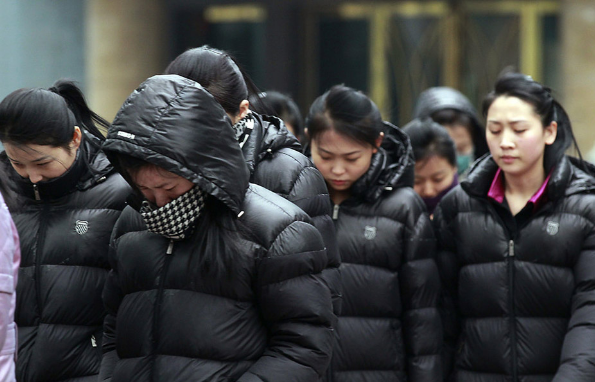
A group of North Korean women in the streets of Dandong, China, in March 2023 being overseen by a government minder. The use of such workers in China is in violation of UN sanctions. (Credit: © Living in North Korea / The Outlaw Ocean Project, March 2023)
Jobs in China are highly coveted in North Korea, because they often come with contracts promising salaries of about $270 a month – much higher than the $3 per month paid for similar work in North Korea. But the jobs also come with hidden costs.
Workers who are selected sign two- or three-year contracts. When they arrive in China, managers confiscate their passports. Inside the factories, North Korean workers wear uniforms that are a different colour than those worn by Chinese workers. “Without this, we couldn’t tell if one disappeared,” a plant manager said.
Shifts run 14 to 16 hours. If workers try to escape, or complain to people outside the plants, their families at home can face reprisals from the government. One worker, who was at a seafood plant in the city of Dalian for several years, described how managers cursed and flicked cigarette butts at them. “I felt bad, and I wanted to fight them, but I had to endure,” she said. “That was when I was sad.”
Workers receive few, if any, holidays or sick days. In seafood plants, the women sleep in bunk beds in locked dormitories, sometimes with 30 people to a room.
One worker, who spent four years processing clams at a factory in Dandong, estimated that more than 60% of her coworkers suffered from depression. “We regretted coming to China but couldn’t go back empty-handed,” she said.
Workers are forbidden from tuning in to local TV or radio, and from leaving factory grounds unaccompanied. Mail is scrutinised by North Korean security agents who also “surveil the daily life and report back with official reports”, a plant manager, who spent several years at a plant in Dalian, said.
Occasionally, the women are allowed to socialise. In a video from 2022, women in blue and white overalls play a game of volleyball outside a seafood plant called Dandong Omeca Food. (The company did not reply to a request for comment.) A viewer commented: “They have been brainwashed, and they don’t know how good the outside world is.”
The women’s wages are typically sent by factory owners to the government in North Korea, where their families can retrieve some of the money once a month. Kim Jieun, a North Korean defector who now works for Radio Free Asia, said the companies tell the workers that their money is safer this way, because they live in dormitories where it could be stolen.
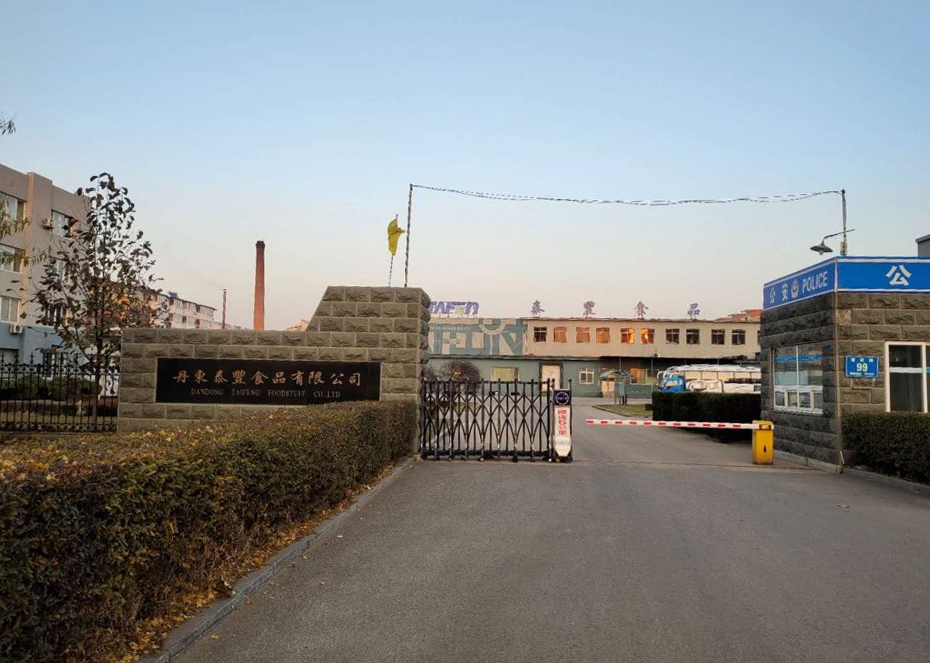
In late 2023, one of the team’s investigators visited a seafood processing plant in northeastern China called Dandong Taifeng, which supplies tens of thousands of tons of seafood to grocery stores in the US and other countries. The investigator found 150 North Koreans working on the processing floor. (Credit: © The Outlaw Ocean Project, Late 2023)
But, because of this system, workers typically see less than 10% of their promised salary. One contract that I reviewed stipulated that $40 would be deducted each month by the state to pay for their food; more is deducted for electricity, housing, heat, water, insurance and “loyalty” payments to the government. What is left is often less than $30 a month. Officials also hold onto wages to discourage defections. But, even if the women were to try to escape the plant, most do not speak Chinese. They have been warned, Kim added, that if they try to defect “they will be immediately caught by Chinese CCTV cameras installed everywhere”. This past October, Chinese authorities repatriated around 600 North Korean defectors, to face punishment in their home country. “China does not recognise North Korean defectors as refugees,” Edward Howell, a professor of politics at Oxford University, told me. “If they are caught by Chinese authorities, they will be forcibly returned to the DPRK, where they face harsh punishment in labour camps.”
Chinese companies have significant incentives to use North Korean workers. Their pay is typically four times less than that of local employees. They are usually not enrolled in mandatory social welfare programmes (retirement, medical, unemployment, work-related injury and maternity), to further reduce costs.
In 2017, Dandong’s Commerce Bureau announced a plan to use North Korean labour at a cluster of new garment processing factories. Its website noted that the workers undergo political screenings to make sure they are “rooted, red and upright”.
“The discipline among the workers is extremely strong,” it added. “There are no instances of absenteeism or insubordination towards leadership, and there are no occurrences of feigning illness or delaying work.”
China’s Ministry of Foreign Affairs did not respond to questions for this piece, but in the past the country has pushed back against criticisms of its relationship with North Korea. The Chinese ambassador wrote in 2023, in a letter to the UN, that China has abided by sanctions even though it has sustained “great losses” as a result, and insisted that it has conducted “thorough investigations” into allegations of noncompliance.
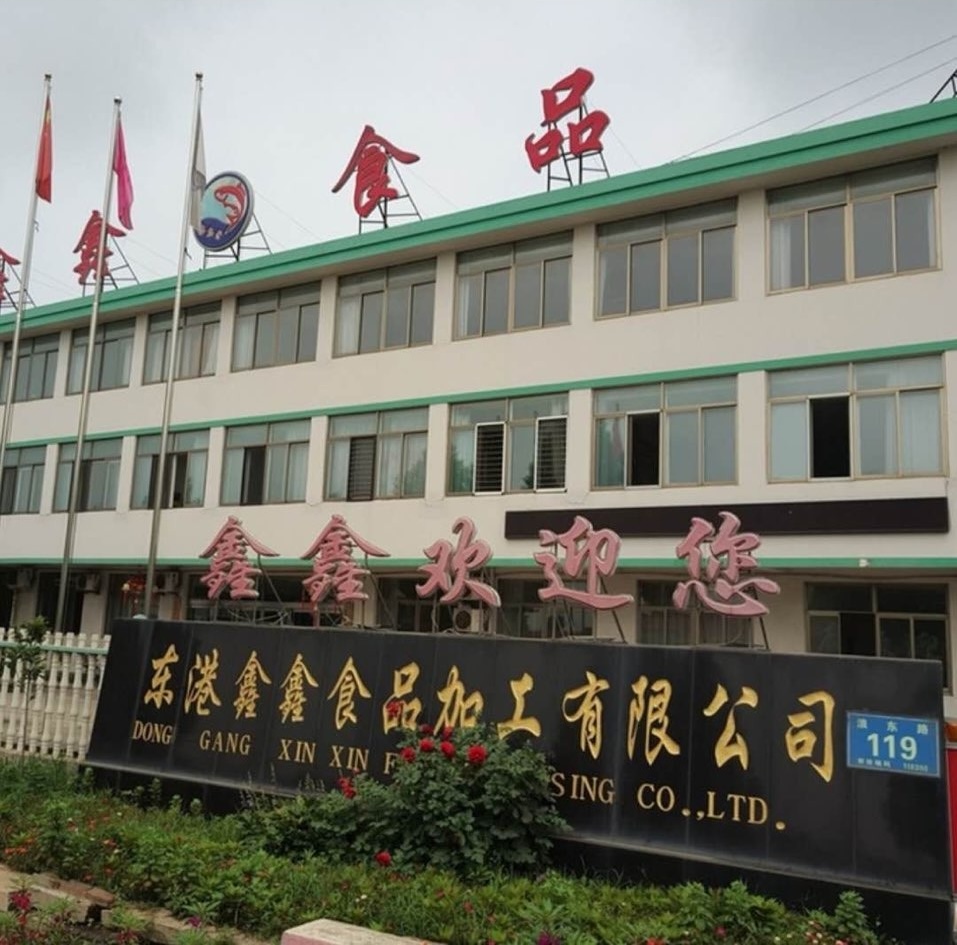
In late 2023, an investigator for the Outlaw Ocean Project visited a Chinese plant called Donggang Xin Xin. He found hundreds of North Korean women working under a red banner that, in Korean, read: ‘Let’s carry out the resolution of the 8th Congress of the Workers’ Party.’ (Credit: © The Outlaw Ocean Project, Late 2023)
A spokesperson for the Ministry of Foreign Affairs has said that China and North Korea have always been “close friends”, adding: “The United States should reflect on its mistakes, shoulder its responsibilities, stop imposing sanctions and military deterrence, and take practical measures to restart meaningful dialogue.”
North Koreans working outside of the seafood industry face harsh conditions, too. In January 2024, according to research by the Korean Institute for National Unification, more than 2,000 workers in Jilin Province rioted when they found out that their wages would be withheld until they returned home, breaking sewing machines and throwing kitchen utensils.
The managers are ‘so stingy with money that they don’t allow us to get medical treatment even when we are sick’.
In recent months, border towns and provinces have published several notices warning businesses about any unpaid wages due to migrant workers. More than 5,000 North Koreans were reported to have entered Russia in the first quarter of 2020, some to work in industries such as logging, where they face brutal winter conditions without proper clothing.
In 2023, according to a study by the South Korean Ministry of Unification, at least 1,000 worked in the Russian construction industry, many living in steel shipping containers on site, or in the basements of the buildings under construction because housing accommodations were not provided. Some of these workers recounted shifts lasting from 7.30am until 2am or 3am.
In preparation for the 2018 and 2022 soccer World Cups, held in Russia and Qatar respectively, thousands of North Koreans were sent to build stadiums and luxury apartments. Workers in Russia described earning 10 bucks a day, with six to eight people living in one trailer. A Russian man who worked alongside them told the Guardian that they lived in conditions of fear and abuse, like “prisoners of war”.
***
It’s illegal to import goods made with North Korean labour, but the law is difficult to enforce. Eighty percent of seafood consumed in the US is imported, for example, and much of it comes from China, through opaque supply chains.
To trace seafood from factories using North Korean labour to the West, my team reviewed trade data, shipping contracts, and the codes that are stamped on seafood packages to monitor food safety. We found that 10 of the plants have together shipped more than 120,000 tonnes of seafood to more than 70 American importers, which supplied grocery stores including Walmart, Giant, ShopRite and Weee!
They also shipped to major chains like McDonald’s, and to Sysco, the largest food distributor in the world, which supplies more than a million restaurants, as well as the cafeterias on American military bases, in public schools and in Congress. (Walmart, ShopRite, Weee! and McDonald’s did not respond to requests for comment. Giant’s parent company, Ahold Delhaize, said that its supplier informed it that they have not sourced from the Chinese plant since 2021, and added that their audit reports showed no evidence of forced labour.)
Two of the plants that investigators from my team visited, for example – Dandong Galicia Seafood and Dalian Haiqing Food – each had an estimated 50 to 70 North Korean workers on site.
One worker who has been employed at Galicia said the managers are “so stingy with money that they don’t allow us to get medical treatment even when we are sick”. Galicia and Haiqing have shipped more than 100,000 tonnes of seafood to American importers since 2017, and Haiqing also shipped to an importer that supplies the cafeterias of the EU Parliament. (Dalian Haiqing Foods said it “does not employ overseas North Korean workers”. Dandong Galicia Seafood did not respond to requests for comment. Trident Seafoods, which supplies Walmart and McDonald’s, said that audits of Haiqing carried out by Chinese-speaking employees “found no evidence or even suspicion” of North Korean labour. Several companies, including Trident, High Liner and Sysco, said they would sever ties with Haiqing while they conducted their own investigations.)
Breuker, from Leiden University, reminded me that American customers quietly benefit from North Korean forced labour. “This labour transfer system is for North Korea and China as economically successful as it is morally reprehensible,” he said. “It’s also a boon for the West because of the cheap goods we get as a result.”
North Korea doesn’t just export its workers. It also exports fish – another means by which the government secures foreign currency. Importing North Korean seafood is forbidden by UN sanctions, but Chinese companies buy it because it tends to be cheap. Sometimes, Chinese captains pay the North Korean government for illegal licences to fish in its waters. Sometimes, they buy fish from boats at sea: A letter from a North Korean, leaked in 2022, proposed selling 10,000 tonnes of squid for $18-million and 500 tonnes of diesel. Sometimes, the seafood is trucked over the border. All of this trade is an open secret.
This past October, a Chinese man who said his first name was Anji, posted a video on Douyin advertising crabs. When a user wrote, “The goods can’t be shipped”, Anji responded with laughing emojis. He explained that he operated a processing plant in North Korea, and gave updates on shipments he planned to truck across the border. (Anji said he stopped importing North Korean seafood in 2016 – although these videos were posted in 2023 – and added: “It’s none of your business, and I don’t care who you are.”) My team traced seafood imported from North Korea, and found that it was bought by several American distributors, including HF Foods, which supplies more than 15,000 Asian restaurants in the US. (HF Foods did not respond to requests for comment.)
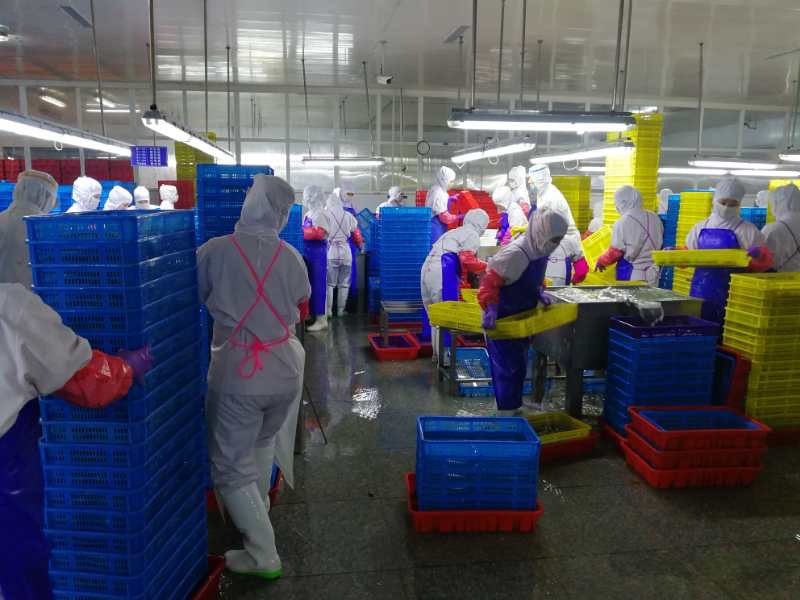
In late 2023, one of the team’s investigators visited a seafood processing plant in northeastern China called Dandong Taifeng, which supplies tens of thousands of tonnes of seafood to grocery stores in the US and other countries. The investigator found 150 North Koreans working on the processing floor. (Credit: © The Outlaw Ocean Project, Late 2023)
Companies often claim they are in compliance with labour standards because they have passed “social audits”, which are conducted by firms that inspect worksites for abuses. But half of the plants that we found to be using North Korean workers were certified by the Marine Stewardship Council, a sustainability group, which only grants certification if companies have passed social audits or other assessments. (Jackie Marks, the MSC’s head of public relations, told me that these social audits are conducted by a third party, not by the organisation, and that “we make no claims about setting standards on labour”.)
In 2023, one of my team’s investigators visited a seafood processing plant in northeastern China called Dandong Taifeng. The company has been designated a “national brand” and supplies tens of thousands of tonnes of shellfish to grocery stores in the US and elsewhere. At the plant, our investigator was given a tour by a North Korean manager.
Millions of dollars, even federal dollars, are going to Chinese plants using North Korean workers, and that money then goes right into the hands of Kim Jong-un’s regime
On the factory floor, which was lit by bright fluorescent bulbs, more than 150 North Korean women, most of them under 35 years old, wore head-to-toe white protective clothing, plastic aprons, white rubber boots and red gloves that went up to their elbows. They stood with their heads down, moving red, yellow and blue plastic bins of seafood. Water puddled at their feet. “Quick, quick,” one woman said to the other members of her small group. (Taifeng did not respond to a request for comment.) Just weeks after that visit, the plant was recertified by the Marine Stewardship Council.
Marcus Noland, the director of studies at the Peterson Institute for International Economics, said of social audits within the seafood industry: “The basic stance appears to be ‘see no evil’.”
Scepticism of such audits is growing. In 2021, the US State Department said that social audits, especially in China, are inadequate for identifying forced labour, in part because auditors rely on government translators and rarely speak directly to workers. Auditors are reluctant to anger the companies that have hired them, and workers face reprisals for reporting abuses. This past November, Customs and Border Protection advised companies to use social audits only if they entail an “unannounced independent, third-party audit; all indicators of forced labour addressed; interviews completed in native language”. Liana Foxvog, who works at the Worker Rights Consortium, said she has not heard of a single audit happening in this manner in China.
Joshua Stanton, an attorney based in Washington, DC, who helped draft CAATSA, argues that the US government is not doing enough to enforce the law.
“The US government will need to put more pressure on American companies, and those companies need to be more diligent about their suppliers and their supply chains, or face stricter sanctions,” he said.
Chris Smith, a Republican Congressman from New Jersey and a specialist on China, noted that social audits “create a Potemkin village”. He added: “The consequence is that millions of dollars, even federal dollars, are going to Chinese plants using North Korean workers, and that money then goes right into the hands of Kim Jong-un’s regime, which uses the money to arm our adversaries and repress its own people.”
***
Late in 2023, I made an effort to communicate more directly with some of the North Korean workers who have been caught up in the programme. Western journalists are barred from entering North Korea, and citizens of the country are strictly prohibited from talking to reporters.
But I hired a team of investigators in South Korea and China who have contacts in North Korea whom they employ to get information out of the country – for example, stories of food shortages, power outages and the rise of anti-government graffiti.
I worked with the investigators and their contacts, some of whom work in the labour-broker industry, to compile a list of two dozen North Koreans who had been dispatched to China, most of whom have since returned home; the workers and managers were a range of ages, came from a variety of regions in the country, and had worked in least half a dozen Chinese factories. I wrote out a list of questions, and sent them, through the investigators, to their contacts in North Korea. These contacts then met the workers to interview them in secret. The interviews were conducted individually so that the workers would not know the identities of others who were speaking, or what they said. The meetings typically occurred in open fields, parks or in the street, where it’s harder for security agents to use bugs to conduct surveillance.
The workers were told that their responses would be shared publicly by an American journalism outlet. They faced considerable risk speaking; experts told me that, if they were caught, they would likely be executed, and their families put in prison camps. But they agreed to talk because they believe it is important for the rest of the world to know about what happens to workers who are sent to China.
North Korean contacts transcribed the workers’ answers by hand, and then took photos of the questionnaires and sent them, using encrypted online tools and satellite phones, to the investigators, who sent them to me. Workers and managers still in China were interviewed in a similar fashion.
Because of these layers of protections, it is, of course, impossible to fully verify the content of the interviews. But I had the responses reviewed by experts to make sure they are consistent with what is known about the work-transfer programme, and with interviews with North Korean defectors. (Two months after this process was completed, our team checked in on the interviewers and interviewees, and everyone was still safe.)
In their answers, the workers described crushing confinement and loneliness. The work was gruelling, the factories smelled and violence was common. “They kicked us and treated us as subhuman,” the worker who spent four years processing clams at a factory in Dandong said.
I asked all the women if they could recount any happy moments. Most said there had been none, though a few said they felt relieved when they returned home and got some of their pay.
“I was happy when the money wasn’t all taken out,” the woman who did product transport in Dalian said. Almost all of the workers had sad moments to recount. One, who recently returned to North Korea, said her experience at a Chinese plant made her feel like she “wanted to die”.
Another, who spent several years at a plant in Dalian, said that she often felt tired and upset while she was working, but kept those thoughts to herself to avoid reprisals. “It was lonely,” she said. “I hated the military-like communal life.”
The most striking pattern was the women’s description of sexual abuse at the plants.
Whenever they can, they flirt with us to the point of nausea and force us to have sex for money, and it’s even worse if you’re pretty.
Of 20 workers I interviewed, 17 said they had been sexually assaulted by the managers sent to watch over them. They described a range of tactics used to coerce them into having sex. Some managers pretended to wipe something from their uniforms, only to grope them.
Some called them into their offices as if there was an emergency, then demanded sex. Others asked them to serve alcohol at a weekend party, then assaulted them there.
“When they drank, they touched my body everywhere like playing with toys,” a woman who spent a few years working at a factory in Dandong said.
The women expressed revulsion. “When they suddenly put their mouths to mine, I wanted to throw up,” the woman who did product transport in Dalian said.
If the women didn’t comply, the managers could become violent. “There are times when he is kind and times when he is angry,” a worker who was at Haiqing for more than four years said of her manager. “When he doesn’t get his way (sexually), he gets angry and kicks me… He calls me a ‘fucking bitch’.”
Three of the women said their managers had forced them into prostitution. “Whenever they can, they flirt with us to the point of nausea and force us to have sex for money, and it’s even worse if you’re pretty,” a worker who was at Haiqing for more than five years told me. The worker from Jinhui noted: “Even when there is no work during the pandemic, the state demands foreign currency funds out of loyalty, so managers force workers to sell their bodies.”
The pandemic made life more difficult for many of the women.
When China closed its borders, some found themselves trapped far from home. Often, their workplaces shut down, and they lost their incomes.
North Korean workers sometimes pay bribes to government officials to secure posts in China, and many borrow these funds from loan sharks. These loans, typically about $1,500, come with interest rates of up to 10%. When work was paused in China, North Korean workers were unable to pay back their loans. As a result, loan sharks sent groups of local thugs to their relatives’ homes to intimidate them. Some of their families had to sell their houses to settle up.
In 2023, two North Korean women at textile plants killed themselves. The worker who told me she thought of suicide said that these kinds of deaths are often kept hidden. “If someone dies from suicide, then the manager is responsible, so they keep it under wraps to keep it from being leaked to other workers or Chinese people,” she said.
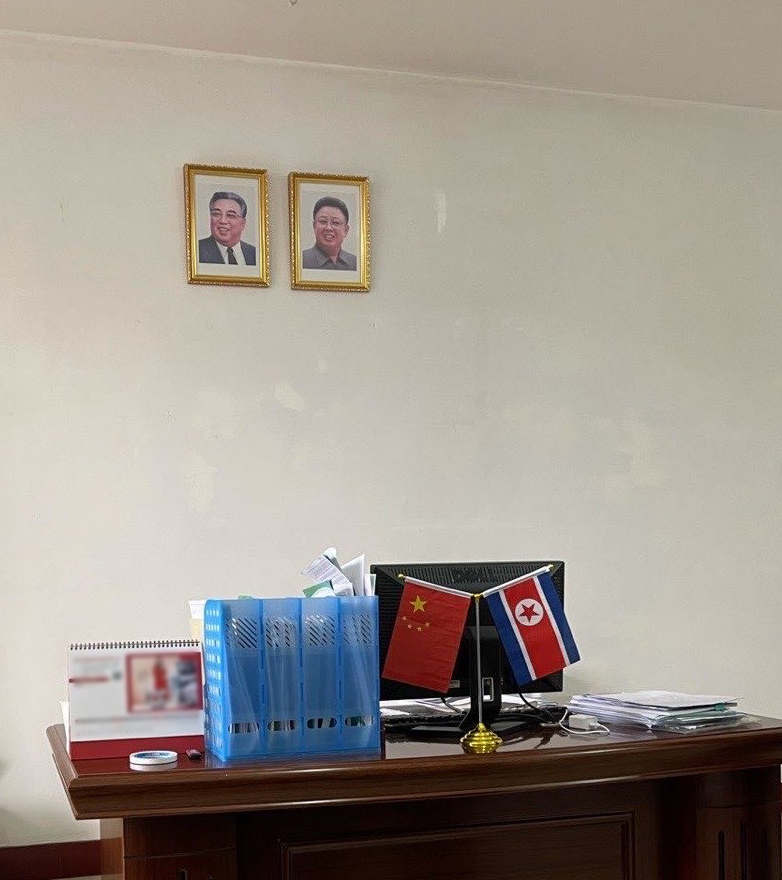
An investigator for The Outlaw Ocean Project visited a plant called Donggang Haimeng Foodstuff, and found a North Korean manager sitting at a wooden desk with two miniature flags, one Chinese and one North Korean. The walls behind the desk were bare except for two portraits of past North Korean leaders Kim Il-sung and Kim Jong-il. (Credit: © The Outlaw Ocean Project, Late 2023)
This past year, the border between China and North Korea reopened.
In August, about 300 North Korean workers boarded 10 buses in Dandong to go back home. Police officers lined up around the buses to prevent defections. In photos and a video of the event, some of the women can be seen hurriedly loading large suitcases onto a neon-green bus, then riding away across the Friendship Bridge.
In September, another 300 boarded a passenger train to Pyongyang, and 200 were repatriated by plane. Workers who return face heavy questioning from the government.
“They asked about every single thing that happened every day from morning to evening in China, about other workers, supervisors and agents,” the worker who processed clams in Dandong explained.
As 2023 ended, the Chinese and North Korean governments began negotiating over the next wave of workers to be dispatched to Chinese factories. According to reporting by Hyemin Son, a North Korean defector who works for Radio Free Asia, labour brokers requested that Chinese companies pay an advance of about $130 per worker; the price had gone up, one told her, because “Chinese companies cannot operate without North Korean manpower”.
Some North Korean workers never went home. One woman, who is in her thirties, said she has spent the past several years gutting fish at a processing plant in Dalian.
She described working late into the night and getting sores in her mouth from stress and exhaustion. I asked her about the worst part of her job, and she said: “When I am forced to have sex.” She also described a sense of imprisonment that felt suffocating. “If you show even the slightest attitude, they will treat you like an insect,” she said.
“Living a life where we can’t see the outside world as we please is so difficult that it’s killing us.” DM
(This story was produced in collaboration with the Outlaw Ocean Project, with contributions from Joe Galvin, Maya Martin, Susan Ryan, Jake Conley, Austin Brush and Daniel Murphy.)




















 Become an Insider
Become an Insider
And the South African government still suck up to the Chinese despite the intolerable treatment the women have to endure. Most of the ANC heavyweights are as bad as the Chinese.